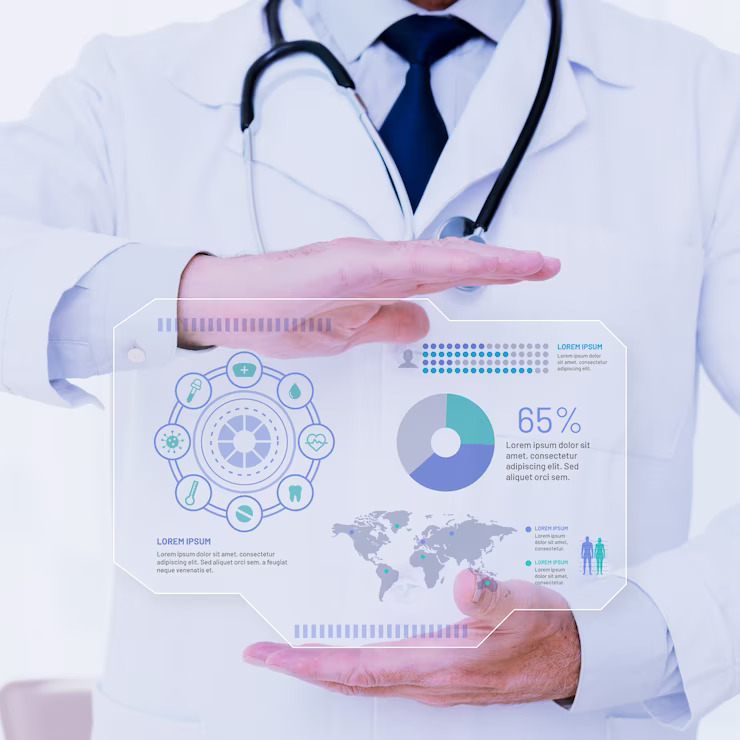How Big Data Analytics is Revolutionizing Healthcare Industry
- 1 What is Big Data Analytics in Healthcare?
- 2 Benefits of Big Data Analytics in Healthcare
- 3 Challenges of Big Data Analytics in Healthcare
- 4 How Big Data Analytics is Revolutionizing the Healthcare Industry
- 4.1 Understanding Clinical Decision Making
- 4.2 Harnessing the Power of Predictive Analysis
- 4.3 Improve Care Outcomes
- 4.4 Enhancing Quality Measurement and Improvement
- 4.5 Maximizing Cost Savings
- 4.6 Combating Fraud and Abuse
- 4.7 Securing Health Information Exchanges
- 4.8 Population Health Management
- 4.9 Research and Development
- 5 Final Thoughts
Data analytics utilizes machine learning and AI algorithms to analyze large chunks of data from multiple sources. In the healthcare industry, next-generation data analytics helps physicians and researchers unlock useful insights to inform decision-making, resulting in better patient outcomes and improved provider financial performance.
What is Big Data Analytics in Healthcare?
Big data analytics is a form of advanced analytics that uses data collected from multiple sources within the healthcare system. The data includes medical records, consumer surveys, and real-time streams. The data is then analyzed to generate insights about trends and correlations among patient populations or specific diseases across geographical areas.
The researchers then leverage the findings to develop new drugs and treatment processes.
Benefits of Big Data Analytics in Healthcare
Big data analytics offers a multitude of benefits to healthcare providers. These include:
- Speeds up the development of new drugs and treatment procedures
- Helps in diagnosing and preventing the spread of ailments
- Provision of real-time healthcare services through telehealth
- Provision of value-based care through the elimination of trial and error
- Availability of data from various sources for informed decision-making purposes
- Data security with proper authentication protocols, such as encryption algorithms, to safeguard sensitive information.
- Secure collaboration with third parties. Healthcare providers, insurers, or government agencies can share confidential medical records using secure networks like blockchain technology.
Challenges of Big Data Analytics in Healthcare
Though big data analytics offers many benefits, some risks are also involved. These include:
- Risks in data privacy: Inaccurate or unauthorized use of personal patient information
- A lack of appropriate infrastructure to store data: Insufficient storage facilities may cause the system to crash and essential data to be lost. It also gives hackers a chance to gain unauthorized access.
- High cost of health analytic solutions: Despite its significance in the healthcare industry, implementing and maintaining big data analytic solutions can be challenging for many organizations. Besides, there is a need for people with specialized skills and knowledge. Healthcare organizations can subcontract big data and analytic companies to automate data collection within their system. You can learn more at ozmosi.com.
- The risk of inaccurate and inconsistent data on the system can mislead future decisions.
How Big Data Analytics is Revolutionizing the Healthcare Industry
Big data analytics provides many opportunities for healthcare providers to improve operational efficiency and reduce costs.
Healthcare organizations need to capitalize on these opportunities for long-term growth by understanding clinical decision-making processes better through predictive analysis, providing personalized care by leveraging patient-centric data, and combating fraud and abuse with claims analysis.
Understanding Clinical Decision Making
Making sound decisions based on evidence is the backbone of medical practice. Clinicians rely heavily on prior knowledge and current findings when making diagnoses and treatment choices for their patients.
Therefore, access to more comprehensive datasets and powerful analytical tools like machine learning (ML) allows clinicians to understand how different factors influence diagnoses, helping them better treat patients.
Harnessing the Power of Predictive Analysis
Predictive analytics is used extensively in healthcare today due to its success in helping organizations forecast future trends accurately. This is done using existing patterns across large volumes of structured or unstructured datasets such as hospital visits or lab results.
Results from data analytics allow healthcare systems to optimize investments into resources, including staffing levels at hospitals or training programs to improve staff retention.
The application also allows providers to predict potential rehospitalization rates among certain groups. It also helps identify high-risk patients who require additional monitoring ahead of time so they receive optimal level of care quickly without compromising their safety.
Improve Care Outcomes
Data about every patient’s health can now be collected easily from electronic health records (EHR) systems. This enables providers to design customized plans tailored to individual needs, preferences, or conditions.
Enhancing Quality Measurement and Improvement
Measuring the quality of care is an essential aspect of the healthcare industry. Access to rich data from various sources allows health systems to analyze performance on different parameters like patient experience or safety scores across procedures over time to identify improvement areas.
Besides, this information can also be used as a feedback mechanism to help clinicians develop better protocols for delivering superior services while ensuring compliance with regulations.
Maximizing Cost Savings
Data analytics provides valuable insights into costs associated with running treatments or managing certain diseases. This allows organizations to make decisions quickly based on these findings instead of trying to extrapolate them from just a few indicators. This might lead to more accurate results due to taking into consideration a larger set of evidence points available at their disposal.
Combating Fraud and Abuse
Fraud and abuse detection is another application where big data analytics plays a significant role in helping organizations pinpoint suspicious activities by analyzing claims patterns. By identifying anomalies such as discrepancies in submitted records or unusual reimbursement, health systems can be more vigilant against fraudulent activities while ensuring strict adherence to compliance regulations governing the system.
Securing Health Information Exchanges
Health information exchanges (HIEs) are essential to healthcare delivery today since they allow organizations to share patient data between providers/payers when required securely.
Big data analytics play a critical role here by helping organizations identify suspicious access patterns that might indicate unauthorized sharing of confidential information or misuse of resources arising from security breaches caused by malicious attacks on databases that store these records.
Population Health Management
Big data analytics has become invaluable for population health management because it monitors specific factors affecting certain demographics.
Apart from providing actionable insights into any potential outbreak-related events, it can also help alert authorities ahead of schedule, allowing them to take necessary steps to mitigate risk through early intervention measures based on collected evidence. This was evident during the COVID-19 outbreak.
Research and Development
In addition to identifying potential cost savings, big data analytics is also used extensively in research development to help uncover new insights into diseases such as cancer while exploring and possibly developing innovative drugs.
Pharmaceutical companies employ advanced techniques to analyze vast amounts of genomic data collected from patients suffering from different ailments to identify correlations patterns between genes which could lead to breakthroughs within this sector.
Final Thoughts
Data analytics has transformed healthcare delivery by providing a comprehensive view of patients’ needs. Thus, healthcare providers can develop personalized plans tailored to individual requirements.
From leveraging patient-centric data to maximizing cost savings through actionable insights generated from analyzed information, its impact on modern-day healthcare is undeniable. Big data analytics is revolutionizing everything from investment decision-making to treatment protocols, thus enhancing overall efficiency within the healthcare system.



















